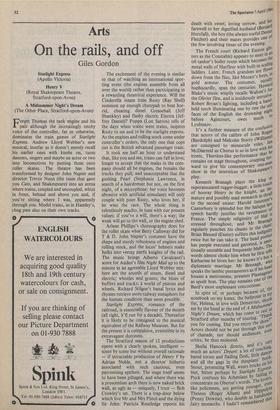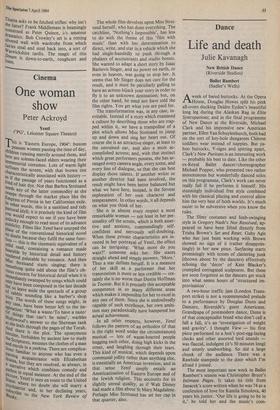Arts
On the rails, and off
Giles Gordon
Starlight Express (Apollo Victoria) Henry V (Royal Shakespeare Theatre, Stratford-upon-Avon)
Forget Thomas the tank engine and his pals although the increasingly tetchy voice of the controller, fat or otherwise, dominates the train games of Starlight Express. Andrew Lloyd Webber's new musical, insofar as it doesn't merely recall his earlier ones with knobs on, turns dancers, singers and maybe an actor or two into locomotives by putting them onto roller skates. The theatre has been transformed by designer John Napier and director Trevor Nunn (the team that gave you Cats, and Shakespeare) into an arena where trains, coupled and uncoupled, whizz in front, behind and above you and, if you're sitting where I was, apparently through you. Model trains, as in Hamley's, chug past also on their own tracks.
The excitement of the evening is similar to that of watching an international spor- ting event (the engines assemble from all over the world) rather than participating in a rewarding theatrical experience. Will the Cinderella steam train Rusty (Ray Shell) summon up enough chutzpah to beat hor- rid, cheating diesel Greaseball (Jeff Shankley) and flashy electric Electra (Jef- frey Daniel)? Poppa (Lon Satton) tells of the days when trains were trains, inspires Rusty to see and to be the starlight express. As the engines and rolling stock come under controller's orders, the only one that cops out is the British advanced passenger train.
It took me half an hour to understand that, like you and me, trains can fall in love; longer to accept that the males in the com- pany should all be engines, the females the trucks they pull; and unacceptable that the gushing Pearl (Stephanie Lawrence, in search of a hairdresser but not, on the first night, of a microphone: her voice becomes abrasive with artificial stimulant) will only couple with poor Rusty, who loves her, if he wins the race. The whole thing is relentlessly macho, in tune with our present values: if you've a will, there's a way; the weak will go to the wall, or the engine shed.
Arlene Phillips's choreography does for the roller skate what Betty Callaway did for T & D. John Napier's costumes have the shape and sturdy robustness of engines and rolling stock, and the locos' helmets make hulks into verray parfit knights of the rail. The music brings Alberto Cavalcanti's score for Auden's film Night Mail up to the minute in an agreeable Lloyd Webber mix: here are the sounds of steam, diesel and electric; whistles and grunts; the blues of buffers and tracks; a world of pistons and wheels. Richard Stilgoe's banal lyrics and rhymes retrieve more railway metaphors for the human condition than seem possible.
Starlight Express, romance of the railroad, is essentially flavour of the month (all right, it'll run for a decade). Thereafter it is likely to be consigned to the musical equivalent of the Railway Museum. But for the present it is compulsive, irresistible in its extravagant dottiness.
The Stratford season of 12 productions opens with a clearly spoken, intelligent scene by scene but without overall rationale — if intractable production of Henry V by Adrian Noble, not a director hitherto associated with such cautious, even patronising epithets. The stage itself seems to have been pillaged, and where there was a proscenium arch there is now naked brick wall, as ugly as — uniquely, I trust — Bob Crowley's set. There is a trap-door below which live Mr and Mrs Pistol and the dying Sir John: Patricia Routledge reports his The Spectator 7 April 1984 death with sweet, loving sorrow, and her farewell to her dignified husband (Bernard Horsfall), the boy (the always useful Dexter Fletcher) and their mates provides one of the few involving times of the evening. The French court (Richard Easton glit" ters as the Constable) appears to meet in an oil tanker's boiler room which becomes the metal walls of Harfleur with built-in scaling ladders. Later, French grandees are flown down from the flies, like Mozart's boys, in gold armour. The costumes, equally haphazardly, span the centuries. Howard Blake's music wispily recalls Walton's for the Olivier film, and is insidiously intrusive. Robert Bryan's lighting, including a hand.: held torch illuminating one by faces of the English the drowning night before Agincourt, owes much Lyubimov. to that actors of the calibre of John Rob It's a further measure of the confusion (Bardolph) and Malcolm Storry (Williams) are consigned to minuscule roles. MP M. cDiarmid as Chorus is so in love with his Thersites-like performance thate remains on stage throughout, creeping fol.., one the still ward to give his contemporary one-me show in the interstices of Shakespeare play. Kenneth Branagh plays the king 3,5, superannuated rugger-bugger, a little toilel` of hooray Henry in the knight, Itt mature and possibly mad monarch in thra?1 to the second estate: Harold Innocent Canterbury is splendid but the Saliqtle laws. speech hardly justifies the ravishment c?' France. The simple religiosity of Hal his stressed throughout, and Mr Branag" regularly punches his chums in the chest.. Brian Blessed (Exeter) suffers this indignity twice but he can take it. The head prefect has people executed and garotted, is tionally unstable and frequently blubs• words almost choke him when he first tells Katharine he loves her: he knows it's but a diplomatic marriage. Mr Branagh, wad speaks the iambic pentameters as if his beau, houses a metronome, presents Plantagene". as spoilt brat. The play remains one of the Bard's most unpleasant concoctions. In spite of, or perhaps because of, the notebook on my knees, the ballpoint in Mr, fist, Helena, in love with Demetrius, shoo me. by the hand at the end of A Midsuilvile Night's `Than,,N, Stratford arefatemr, months has tcooumrinegto rest you for coming. Did you enjoy the show.I. critics, should not be put through this saga of. .charade, nor should audiences, eve
be thus molested.
Sheila Hancock directs, and its very much an actors' Dream: a lot of touching; bared torsos and flailing flesh, little &Ile?, and all the gags in the thespians' booN.: Snout, presenting Wall, wears bricks on his feet, bitten perhaps by Starlight EXPress,, Puck confuses his Athenians by failing t" concentrate on Oberon's words. The loversi; like policemen, are getting younger, eta Theseus (Roger Allam) and HiPP°% (Penny Downie), who double as handsoin'c. ,fairy monarchs. I hadn't remembered Oa Titania asks to be fetched trifles: why isn't she fatter? Frank Middlemass is beamingly concerned as Peter Quince, i/c amateur dramatics. Bob Crowley's set is a rotting silvered wall with wardrobe from which fairies steal and steal back into, a sort of Warwickshire tardis. The magic of this Dream is down-to-earth, roughcast and loam.











































 Previous page
Previous page